British spies say Wuhan lab leak is 'feasible'
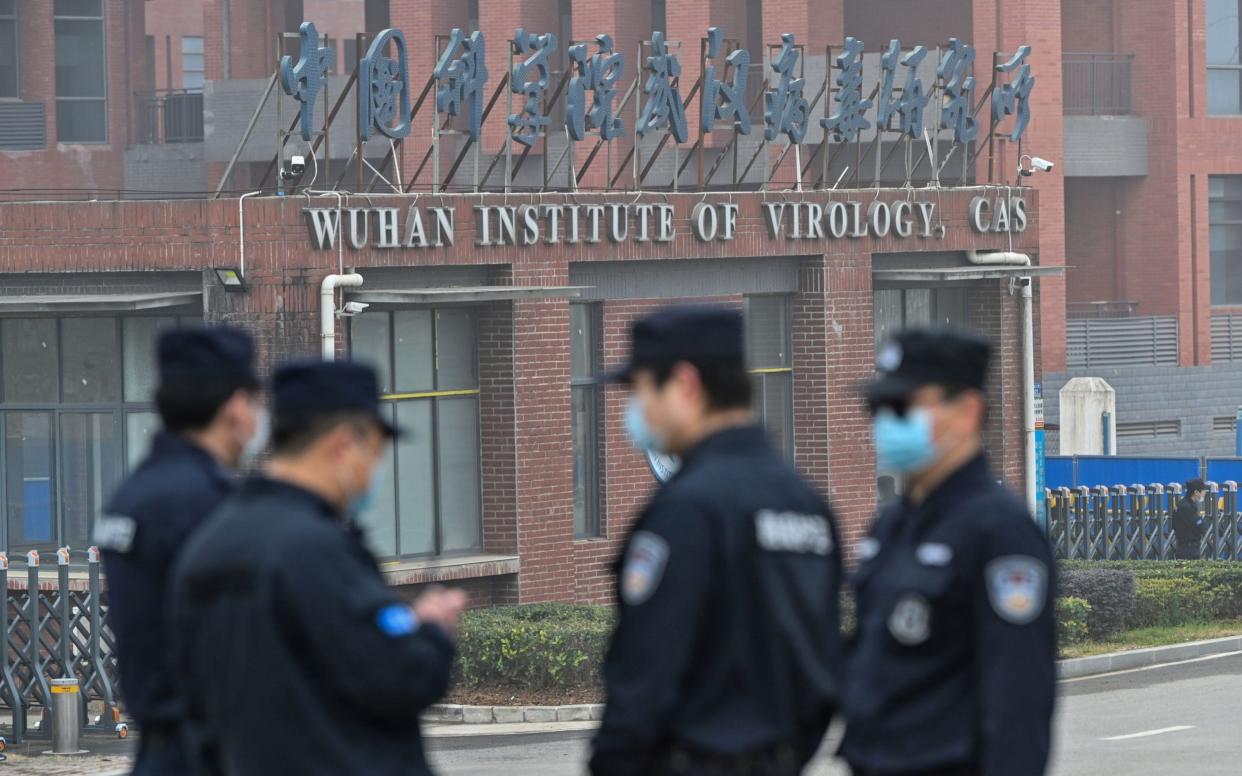
- Oops!Something went wrong.Please try again later.
04:30 PMWhat happened today?
What happened today?
Good evening. Here is a round-up of today's major coronavirus news:
The Vaccines Minister has insisted that the World Health Organization must be able to fully investigate the origins of the pandemic after reports British agents believe a lab leak is "feasible".
Holidaymakers will be hammered by soaring prices if the Government keeps its green list for July and August under wraps, the boss of Heathrow Airport warned.
Health experts urged Boris Johnson to consider giving the Covid-19 vaccine to children as young as 12 to protect teachers.
Thousands of football fans will be allowed to gather in Glasgow during the Euro 2020 tournament in less than a fortnight if efforts to suppress an outbreak of the Indian variant are sustained.
Long Covid is highly uncommon in children, new scientific studies suggested.
And couples have already started to cancel or postpone their summer weddings due to a “vicious cycle” of uncertainty about the June 21 reopening date, wedding planners said.
04:14 PMItaly extends travel ban amid Indian variant concerns
Italy extends travel ban amid Indian variant concerns
Italy has extended a travel ban for people coming from India, Bangladesh and Sri Lanka as it seeks to prevent more transmissible variants reaching the country.
Italian residents are exempt from the ban, which was introduced in April but has now been extended until June 21, a spokesman for Italian Health Minister Roberto Speranza said in a statement.
The World Health Organization (WHO) has confirmed that the Indian variant has reached 53 different territories, while unofficial sources link it to a further seven countries.
04:02 PMVietnam detects new hybrid of Indian and UK Covid-19 variant
Vietnam detects new hybrid of Indian and UK Covid-19 variant
Vietnam health minister Nguyen Thanh Long said on Saturday the country has detected a new variant of the coronavirus, a mix of the Indian and UK Covid-19 variants that spreads quickly by air, online newspaper VnExpress reported.
After successfully containing the coronavirus for most of last year, Vietnam is now battling an outbreak that is spreading more quickly.
Nearly 3,600 people have been infected in 31 of its 63 cities and provinces since late April, accounting for more than half of the country's total infections.
"After running gene sequencing on newly detected patients, we have discovered a new variant that is a mix of India and UK ones," Nguyen Thanh Long was quoted as saying.
"More specifically, it is an Indian variant with mutations that originally belong to the UK variant," he said. VnExpress quoted Long as saying Vietnam would announce the newly discovered variant to the world soon.
03:48 PMBoris Johnson and Carrie Symonds to have larger post-Covid celebration
Boris Johnson and Carrie Symonds to have larger post-Covid celebration
Boris Johnson and Carrie Symonds are to have a larger celebration of their marriage in 2022, at a time when coronavirus restrictions are likely to have been relaxed.
It comes after their secret wedding yesterday, which was followed by a reception at Downing Street.
A No 10 spokesman said: "The Prime Minister and Ms Symonds were married yesterday afternoon in a small ceremony at Westminster Cathedral.
"The couple will celebrate their wedding with family and friends next summer."
It was reported earlier in the week that the couple have sent 'save-the-date' cards for July 30 2022.
03:27 PMMore than 25 million adults at least partially vaccinated in France
More than 25 million adults at least partially vaccinated in France
More than 25 million adults in France have now had at least one dose of a coronavirus vaccine, as hospitalisations fell to below 17,000.
French authorities will open up the vaccination roll-out to anyone over the age of 18 tomorrow amid steadily declining case rates after two peaks in November and April.
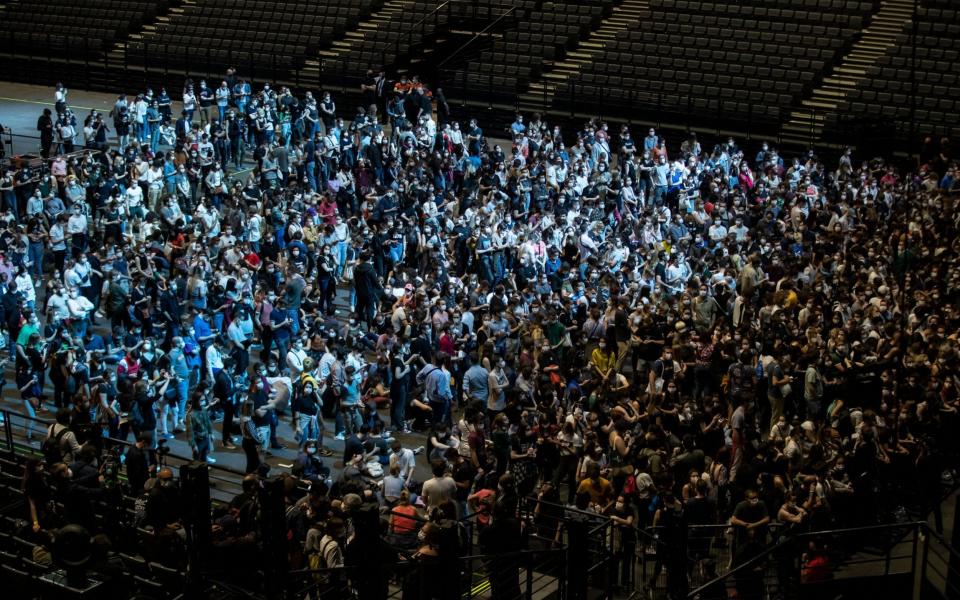
It comes a day after France's first indoor live performance in over a year was held as part of a test event, which saw 5,000 people attend a rock concert headlined by the band Indochine.
03:19 PMCovid data update delayed
Covid data update delayed
Today's case, death and vaccination data has been delayed because of technical difficulties affecting Welsh vaccine reporting, a message on the Department for Health website says.
"We will update the dashboard as soon as we are able to," the message reads.
03:04 PMEuro 2020 fan zones poised to go ahead in Glasgow despite Indian variant threat
Euro 2020 fan zones poised to go ahead in Glasgow despite Indian variant threat
Thousands of football fans will be allowed to gather in Glasgow during the Euro 2020 tournament in less than a fortnight if efforts to suppress an outbreak of the Indian variant in the city are sustained, John Swinney has said.
The Deputy First Minister insisted a fan zone, which is due open on June 11 and hold up to 6,000 football supporters per day during the tournament, was a “very regulated environment” with “significant constraints” on who can enter.
He also indicated that a total of 24,000 fans would still be allowed to attend two matches at Hampden, in the heart of Glasgow’s south side, where the outbreak has been worst.

Mr Swinney said he was “optimistic” that the city would move out of level 3 lockdown at the end of the week and join the rest of the mainland in level 2, meaning licensed premises could start serving alcohol indoors.
But hospitality chiefs expressed fury that SNP ministers have banned serving a glass of wine with a meal while approving plans for the fan zone and Hampden matches, despite the latter being in the country’s Covid “hot spot.”
Simon Johnson has the full story here.
02:45 PMCovid lockdown roadmap: The latest rules and news on June 21 reopening
Covid lockdown roadmap: The latest rules and news on June 21 reopening
The Health Secretary has said that it is too early to say whether the country can fully reopen on June 21, amid claims the Indian variant is now the dominant strain in Britain.
Mr Hancock said earlier in the week that "potentially as many as three quarters of all new cases" are the Indian variant.
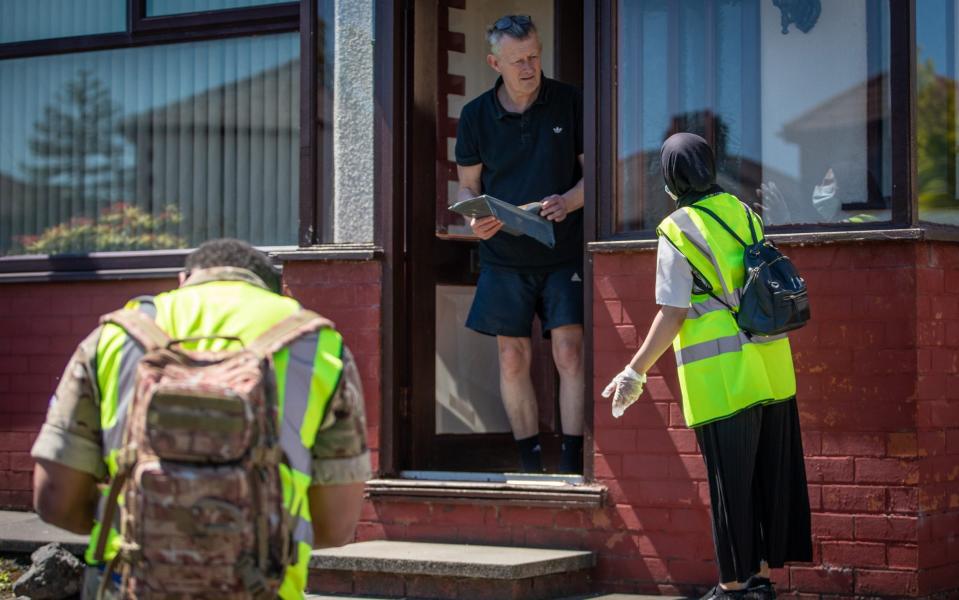
It comes after Downing Street refused to rule out local lockdowns on May 26 to tackle the spread of the Indian strain. While the number of patients admitted to hospital with coronavirus has continued to fall, there has been a rise in cases, which the Health Secretary confirmed remain focused in "hotspots".
Mr Hancock said: "It is too early now to say, yet, whether we can take the full step four on June 21. I desperately want us to, but we will only do that if it's safe."
Here is everything we know about the next stage of easing restrictions.
02:30 PMSunak pushes Biden for tougher global tax deal amid pandemic recovery
Sunak pushes Biden for tougher global tax deal amid pandemic recovery
Rishi Sunak is pushing the United States to agree to tougher rules on the tax paid by tech giants as part of a global corporation tax overhaul.
Finance ministers from the G7 will meet this week to thrash out the biggest reforms to global tax rules in a generation in a bid to ensure multinational companies pay their fair share.
President Joe Biden has proposed a minimum global corporation tax rate of 15pc as well as new rules forcing the world's largest 100 companies to pay taxes based on the location of their customers, rather than where they book profits.
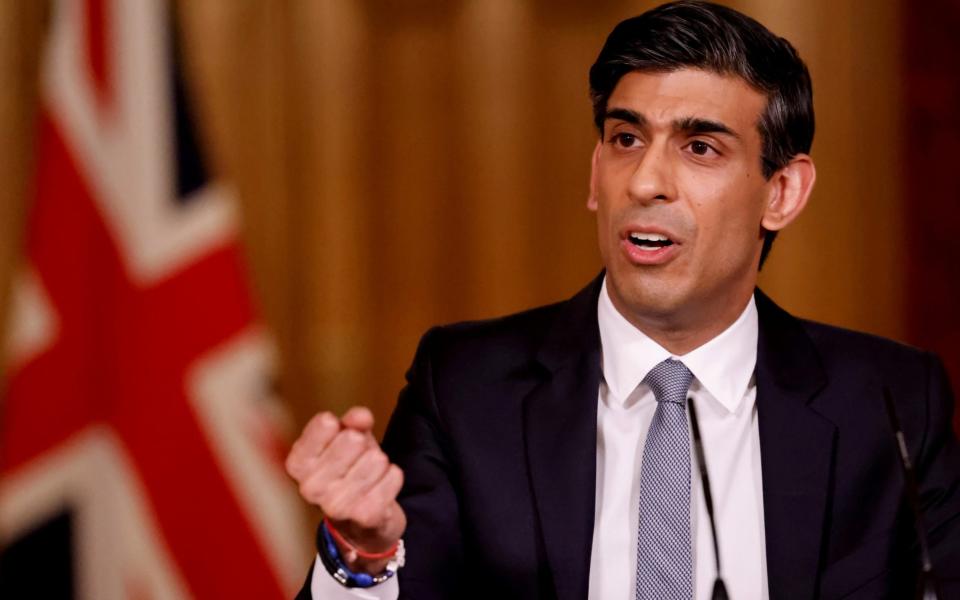
The plans are aimed to preventing multinationals from shifting profits to low-tax jurisdictions - a growing problem that is feared will deprive governments of revenues as they try to recover from the pandemic.
However, the UK is holding out on backing America's plans for a minimum corporation tax rate as it seeks more assurances over the tax treatment of big tech companies such as Facebook, Amazon and Google.
Rachel Millard has more here.
02:17 PMJune 21 reopening still surrounded by 'uncertainty', says Spi-M member
June 21 reopening still surrounded by 'uncertainty', says Spi-M member
A member of the Government's modelling advisory board has said there is still "quite a lot of uncertainty" around the planed lifting of all lockdown restrictions on June 21.
Dr Mike Tildesley, who sits on the Scientific Pandemic Influenza Group on Modelling (Spi-M) panel, told LBC that the UK is in "a very different place" to January with far lower levels of cases, hospitalisations and deaths.
However, Mr Tildesley added, "we are starting to see signs of course that cases are going up. At the moment we're still obviously reporting hospital admissions and deaths at very low levels."
He said that there could be a delay of as long as two weeks between an increase in transmission and a rise in hospital occupancy.
"The problem is, if you have huge numbers of cases, then that increases the risk of the virus mutating, and it may be that you might get a variant emerging that all of a sudden evades the vaccines completely."
01:59 PM'The consequences of delaying Freedom Day would be terrible'
'The consequences of delaying Freedom Day would be terrible'
The Indian variant is spreading fast, writes Matthew Lynn. The daily total of infections has started to climb again. New strains may still emerge, restrictions on British travellers abroad are starting to be reimposed, and we still don’t know if enough people have been fully vaccinated to create a barrier that the virus cannot break though.
Even with life starting to return to something a little closer to normality there are already fears that the roadmap for removing all Covid restrictions might be delayed – and we might not fully reopen next month.
However, the economy simply cannot afford such a delay. Lots of businesses remain on a financial knife-edge, little more than a whisker away from collapse. The self-employed have been pummelled into despair.
Millions of workers are still on furlough, and with every week they remain there more jobs disappear. And the Government has already taken on towering levels of debt and can scarcely afford to run it up any higher.
If hospitalisations start to significantly rise, that would be a different kind of emergency. But with vaccination rates so high, there is no case for locking down the economy for even longer.
01:43 PMKenya extends its Covid curfew for two months
Kenya extends its Covid curfew for two months
Kenya will extend its nightly curfew for a further 60 days in order to curb the spread of coronavirus, ministers have confirmed today.
The curfew, lasting from 10pm to 4am, was brought in by President Uhuru Kenyatta in late March and was also initially introduced for two months.
Legislation which bans protests, rallies and processions that have the capacity to become 'super-spreader' events has also been extended by another two months.
Kenya has recorded 170,485 cases and 3,141 deaths, Ministry of Health data showed on Saturday. The country's current test positivity rate is 8.9 per cent
01:29 PM'Why has China been given such an easy ride over Covid 19?'
'Why has China been given such an easy ride over Covid 19?'
We have spent the last year lambasting our own government over the handling of the pandemic – not without good reason in many cases, writes Ross Clark.
The US, Brazil, Sweden and many other countries: all have been accused at various times of incompetence or recklessness. Meanwhile, the country where it all began has escaped almost any kind of censure; indeed, it has regularly received admiration for the way it suppressed the outbreak in Wuhan.
Nothing exemplified the fawning attitude towards China than the letter sent to the Lancet last March condemning anyone who dared suggest that the pandemic could have originated from a laboratory leak in Wuhan. The scientists tried to imply that in merely raising the issue of Chinese culpability people were guilty of ‘prejudice’.
Even if Covid wasn’t a laboratory accident, and jumped to humans from a bat as the Chinese government wants us to believe, the country would hardly be free of culpability. Bats were known to be a reservoir from SARS-like viruses, whose potential for infecting humans was well known from the original SARS outbreak in 2002 – so why were they still on sale in wet markets? It was as if Britain had not lifted a finger to counter BSE.
Then of course was the secrecy. The World Health Organisation’s praises for China’s “openness” over Covid deserved to be greeted with howls of derision after the initial efforts of authorities to silence the whistleblower who first warned of a SARS-type virus. Yet they hardly raised a whimper.
01:13 PM537,283 vaccinations given out in England yesterday
537,283 vaccinations given out in England yesterday
A total of 537,283 vaccinations were given out across England yesterday, Department for Health data show.
This breaks down into 155,467 first doses and 381,816 second doses of a coronavirus vaccine.
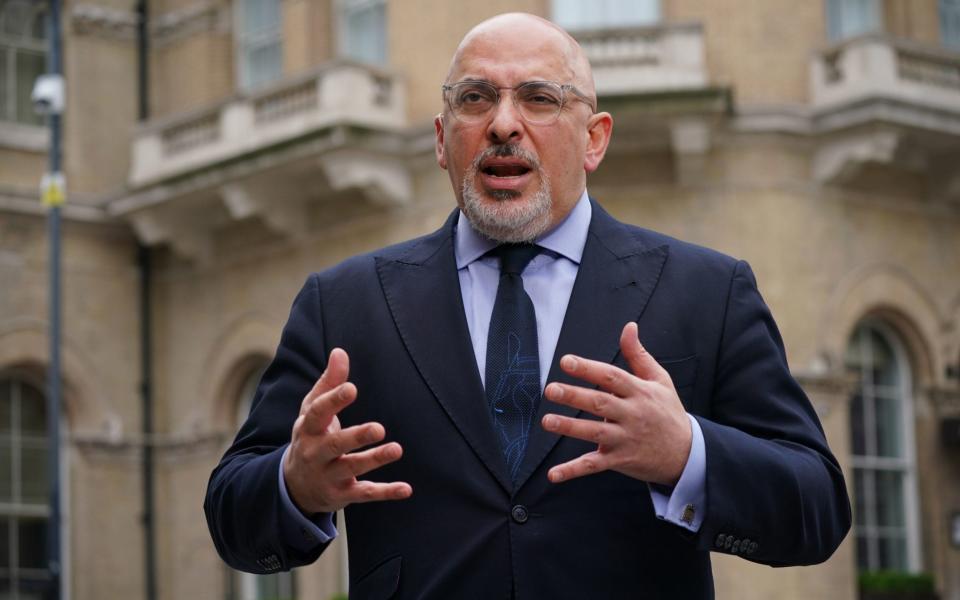
It is down slightly on the 555,477 vaccine doses given out in England on Friday.
The full vaccine data for across the UK will be published later today by the Department for Health, alongside the latest figures showing cases and deaths.
01:00 PMHeathrow chief: Reveal future green list to save travellers from soaring prices
Heathrow chief: Reveal future green list to save travellers from soaring prices
Holidaymakers will be hammered by soaring prices if the Government keeps its green list for July and August under wraps, the boss of Heathrow Airport has warned.
In an exclusive interview with The Telegraph, John Holland-Kaye said the Government should do British families a service by revealing the summer's likely safe destinations when they update the countries on the quarantine-free green list next week.
He said he believed holiday destinations such as Spain and its islands were "coming into the green zone" with low Covid infection rates and, even if they did not make the list next week, should be signalled by ministers as ready for take-off for the July school holidays.
Otherwise, Mr Holland-Kaye said airlines and tour operators would be forced to scale back their summer schedules, leaving holidaymakers with low availability and surging prices.
Our Home Affairs Editor Charles Hymas has the story.
12:42 PMVaccines minister: Regulators will look 'very carefully' at vaccinating children
Vaccines minister: Regulators will look 'very carefully' at vaccinating children
The vaccines minister has said the regulators will look "very carefully" at the prospect of vaccinating children after the completion of the roll-out among adult Britons.
"You have to make sure the vaccines are incredibly safe before you give them to children," Nadhim Zahawi told Sky News. "We've seen the Pfizer/BioNTec vaccine being approved by the US regulator and the Canadian regulator for 12-to-15-year-olds.
"The MHRA, our own independent regulator, and of course the Joint Committee on Vaccination and Immunisation will have to look very carefully at this - some children get infected you're vaccinating to protect their families and communities and the country.
"So vaccines as Chris Whitty said have to be incredibly safe before vaccines are administered to children. But we will be ready. The infrastructure we have built allows us to deploy vaccines for 12-to-15-year-olds as well as planning for the boost in the autumn and the flu vaccination campaign."
Mr Zahawi also offered his congratulations to Prime Minister Boris Johnson on getting married to his fiancée Carrie Symonds.
12:24 PM'Dominic Cummings’ savage attack was a tactical error'
'Dominic Cummings’ savage attack was a tactical error'
A fair few newspapers and broadcasters have asked me what I thought of the evidence Dominic Cummings gave to the House of Commons last week, writes Liam Halligan.
While there’s been much focus on the political pyrotechnics, I’d say at the outset Cummings showed much humanity during this evidence session.
For the most part, though, the language Cummings used last Wednesday was so strong, the personal attacks so vituperative, that his many detractors can now dismiss the substance of his testimony as false, driven by bitterness and revenge.
That’s a shame and, I’d say, a tactical error by Cummings – who is truly driven by a desire to make government work, generating better outcomes for ordinary people.
Yet because his criticisms of others were so sharp and venomous, a great deal of enormous value in his statements – the words of a clever and genuinely independent political outsider who somehow made it to the power coalface – is now much easier for officialdom to ignore.
12:13 PMRetailers face ‘tsunami of closures’ over unpaid rents
Retailers face ‘tsunami of closures’ over unpaid rents
High streets are threatened with a “tsunami” of shop closures as landlords are freed to claim billions of pounds in unpaid rent through the courts, retailers have warned.
Commercial landlords have been barred from legal action to claim rent or evict tenants under a moratorium agreed at the start of the pandemic as shops were closed.
But the British Retail Consortium warns that two thirds of firms are braced for legal demands from landlords to collect some £2.9bn in rent arrears when the ban comes to an end on June 30.
Helen Dickinson, chief executive of the BRC, said: “Many retailers have taken a battering over the pandemic, but they are now getting back on their feet and playing their part in reinvigorating the economy.
“The unpaid rents accrued during the pandemic, when most shops were shut, are a £2.9bn ball and chain that hold back growth and investment and could result in a tsunami of closures.”
Russell Lynch has the story.
11:58 AMHealth experts urge PM to vaccinate children as young as 12
Health experts urge PM to vaccinate children as young as 12
Health experts are urging Boris Johnson to consider giving the Covid-19 vaccine to children as young as 12 to protect teachers, writes Adam Barnett.
Professor Anthony Harnden, deputy chairman of the Joint Committee on Vaccination and Immunisation, said experts would give the Government "a range of options" on whether 12-year-olds should get the Covid jab.
But it would need to be balanced against the level of risk for children, and whether vaccines should instead be sent abroad to vaccinate the world's adults.
It came as the UK's medicines regulator, the Medicines and Healthcare products Regulatory Agency, this week approved the Johnson & Johnson vaccine, and as the total number of Indian variant cases in England rose by 3,535 to 6,959 in the past week.
Prof Harnden, speaking to the BBC yesterday, said: "Clearly with children there are a range of different options that involve whether we select certain children to be immunised on the basis of risk. We do know that the majority of children do not have a huge risk of complications."
11:44 AMGerman children can be vaccinated without parental consent from June 7
German children can be vaccinated without parental consent from June 7
German children as young as 12 can be vaccinated without their parents’ consent from June 7, Daniel Wighton reports from Berlin.
Under German law, a person does not need to be 16 in order to consent to a medical procedure such as a vaccination, provided they can show they “understand the procedure”.
“This is part of everyday life in (doctor’s) practices, for example with vaccinations against HPV (human papillomavirus),” legal expert Rudolf Ratzel told German tabloid Bild on Sunday.
Mr Ratzel said doctors will take several factors into account in determining whether the teenager understands, including the extent to which they have informed themselves of the procedure, along with awareness of the risks of the virus itself.
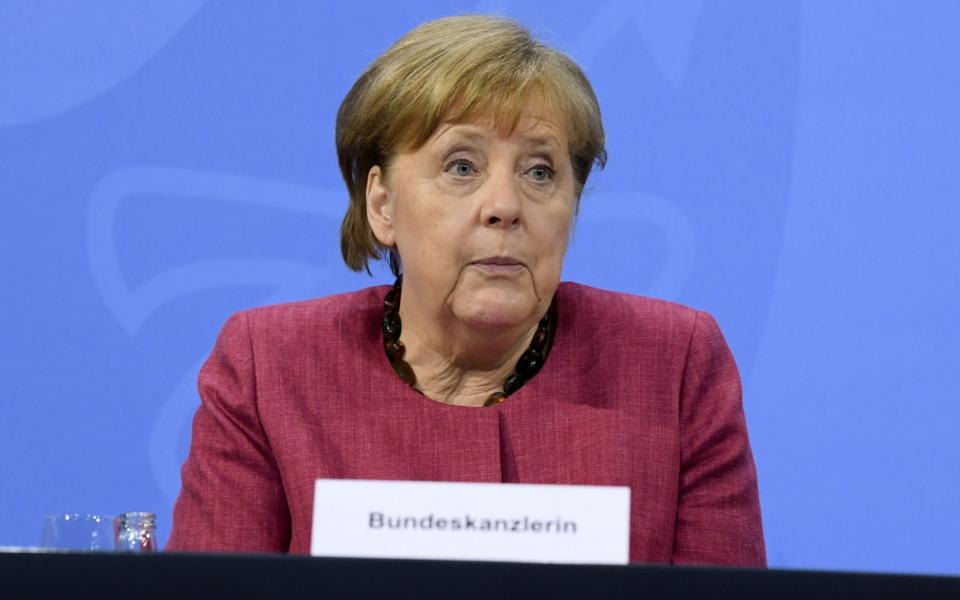
Mr Ratzel also confirmed that under German law parents could not compel their teenage children to be vaccinated if they refuse to do so.
However, Mr Ratzel said that in practice, most adolescents will not meet that "ability to understand" criteria until they are a bit older than 12: “Depending on their development, adolescents can already show this at 14 or 15.”
The European Medicines Agency approved the BioNTech/Pfizer vaccine for use among people aged 12 and over on Friday, with Germany to start the vaccinations from June 7. Previously, only those aged 17 and over were allowed to have the jab.
According to Public Health England, people aged 10 to 19 currently have the highest Covid infection rate, at 55.2 cases per 100,000 people.
11:26 AMUS to sent 1m vaccines to South Korea for military personnel
US to sent 1m vaccines to South Korea for military personnel
South Korea will get one million doses of Johnson & Johnson's coronavirus vaccine this week mainly to innoculate military personnel, after the United States almost doubled a pledge made earlier this month, Prime Minister Kim Boo-kyum announced today.
South Korea has reported a lower death toll than many comparable developed countries from Covid-19, but the government has come under criticism for a comparatively slow rollout of vaccines. Less than 11 per cent of its 52 million people have so far received a first dose.
US President Joe Biden, at his first summit with President Moon Jae-in earlier this month, promised to supply 550,000 shots for South Korean troops.
Kim said that offer had now been increased to one million doses, and the shots will arrive this week and thanked the Biden administration for its commitment to the alliance.
J&J coronavirus vaccine Q&A: how effective is it and does it work against variants?
11:20 AMHow India's second Covid wave has hit mothers and babies
How India's second Covid wave has hit mothers and babies
At first, Chandan Vaishnav was not too worried about his wife, Lata, who had just tested positive for Covid-19. She was eight months pregnant and was, in theory, more vulnerable to the disease as India's second wave of the coronavirus has been hitting pregnant and post-partum women hard.
Still, Mr Vaishnav thought, this was Delhi, the capital, which has some of the best health facilities in the country. But the first hospital the couple went to refused to take her. So did the second.
In the midst of a second wave that was overwhelming an already strained healthcare system, hospitals in Delhi were struggling to procure enough oxygen and patients were scrambling for limited beds.
Over the space of two days, her condition gradually deteriorating, Lata was turned away from more than 20 hospitals; Mr Vaishnav estimates that he called another 50 to 60.
“I got the same reply – ‘we can’t take her. We don’t have enough beds.’”
Find out what happened here.
11:10 AMHotel quarantine 'worst ever experience' after mother and baby ended up in hospital
Hotel quarantine 'worst ever experience' after mother and baby ended up in hospital
A family returning to the UK have said staying in a quarantine hotel was their "worst ever experience" after a mother and baby were left needing hospital treatment.
Abby Pansegrauw, 34, and her one-year-old baby son both had to be treated in hospital, the latter for three days, as a result, they say, of food given to them at Novotel London Heathrow Airport in April.
Staying with her husband, Etienne, and two other children, Mrs Pansegrauw, whose family splits their time between southwest London and Tadpole Village, Wiltshire, was returning after four months stranded in South Africa's Eastern Cape as a result of the country being placed on the UK's red list.
They had initially visited family for a short trip in December.
"(Mrs Pansegrauw) ended up on a drip, because she was so dehydrated," Mr Pansegrauw, 41, who moved to the UK from South Africa in 1999, told the PA news agency. "The hotel refused to acknowledge it and refused to apologise.
"I would say it's the worst experience I've ever had - not just hotel experience."


10:58 AM‘Warrior spirit’ and sheep diplomacy: how Mongolia is sprinting ahead in vaccine race
‘Warrior spirit’ and sheep diplomacy: how Mongolia is sprinting ahead in vaccine race
Mongolia is a small player on the international stage, best known for its expansive, rugged landscapes and nomadic culture.
But amid a frantic global scramble for vaccines, the sparsely populated nation has become the latest – and perhaps most surprising – member of an elusive club: those with plenty of shots.
According to the latest government data, 88 per cent of Mongolia’s adult population has had their first vaccine, while 40 per cent have been given two. In the capital city, Ulaanbaatar, nearly 99 per cent of adults have had at least one jab – and there are no signs the country will soon exhaust its supply.
Like other smaller, not necessarily wealthy, countries that have seen success – notably Bhutan and Serbia – Mongolia has exploited close relationships with its neighbours, superpowers that are keen to further their own aims through ‘vaccine diplomacy’.
Though India sent a donation of roughly 150,000 AstraZeneca vaccines in late February and close to 100,000 have arrived through the Covax distribution scheme, the bulk of roughly 4.3 million doses so far have come from China and Russia.
Our Global Health Security team have more details here.

10:47 AM'Deeply insensitive': MP criticises minister's comments on care homes
'Deeply insensitive': MP criticises minister's comments on care homes
The government is kicking the issue of coronavirus in care homes "into the long grass", according to the Liberal Democrat MP Layla Moran, following growing anger around the decision to discharge patients from hospitals without Covid tests.
Speaking to Andrew Marr this morning Vaccines Minister Nadhim Zahawi insisted that the Government did throw a "protective ring" around the care sector in the early days of the pandemic. He added that hindsight is a "wonderful thing" (see 9:50am).
But Moran, who is chair of the All-Party Parliamentary Group on Coronavirus, said his comments were "deeply insensitive":
"The government must urgently look into its failures on care homes instead of kicking the issue into the long grass.
"Nadhim Zahawi's repeated claims that hindsight is a wonderful thing were deeply insensitive to all those families who have lost loved ones in care homes during the pandemic. They need answers now, not empty soundbites and excuses.
"It appears that ministers failed to act when social care leaders raised the alarm at the time. We need an urgent public inquiry to find out why these warnings were ignored and ensure care home residents are not abandoned again."
10:35 AMWatch: Minister congratulates Boris Johnson on wedding, talks about vaccinating children
10:24 AMAnalysis: Confusion reigns for vaccinated Americans
Watch: Minister congratulates Boris Johnson on wedding, talks about vaccinating children
10:24 AMAnalysis: Confusion reigns for vaccinated Americans
Analysis: Confusion reigns for vaccinated Americans
A few days ago I went to my local supermarket in a suburb of Washington, writes Nick Allen.
There was a sign on the door saying that, on the advice of the US Centers for Disease Control and Prevention, masks are no longer required inside if you're fully vaccinated.
More than half of adults in America, including myself, are now completely jabbed up (see chart below). So I was surprised to discover that I was the only person in the store not wearing a mask.
I've since been to two more shops, including a monster-sized outlet called Target. Both of those stores, also on the advice of the CDC, do not require masks to be worn. Yet, on each occasion, everyone I saw inside - customers and staff - was still wearing them.
On my way out of one shop I overheard two men talking about having had no ill effects after their second jabs. Yet they were both still wearing masks. In the car park.
So what's going on here? Find out here.
10:13 AMCovid hospital admissions aren't rapidly rising despite India variant, says NHS chief
Covid hospital admissions aren't rapidly rising despite India variant, says NHS chief
There's a lot of interest at the moment about whether the India variant, called B.1.617.2, is triggering a surge in hospitalisations - or whether the UK's vaccination rollout is protecting the country.
Chris Hopson, chief executive of NHS Providers, has pulled together this interesting Twitter thread running through the situation right now for hospitals. Here are his key points:
Covid-19 hospital admission rates not increasingly rapidly, even in India variant hotspots. "They vary between climbing slowly, plateau-ing or, interestingly, starting to reduce", he said.
Patients significantly younger than previous peak. Hopson said this means there is, generally, less need for critical care than in previous peaks.
Of those patients in hospital, only "a handful" have had two doses of a Covid vaccine - the significant majority have not had either.
Yet, Hopson warns in the second half of his Twitter thread, "it is incredibly striking how busy and pressured hospitals currently are". This is due to a backlog in patients for other conditions, more complex cases and, worryingly, an increased average time spent in hospital.
So what does this all mean for June 21? There is a difficult decision ahead, writes Hopson. Below is an extract of the thread if you want to find out more:
2/25 Having spoken to NHS trust CEOs in hotspot areas in last 48 hours, central message remains broadly the same. Namely A. Covid-19 hospital admission rates not increasingly rapidly. They vary between climbing slowly, plateau-ing or, interestingly, starting to reduce.
— Chris Hopson (@ChrisCEOHopson) May 30, 2021
10:00 AMCouples cancelling summer weddings due to 'vicious cycle' of uncertainty
Couples cancelling summer weddings due to 'vicious cycle' of uncertainty
Couples have already started to cancel or postpone their summer weddings due to a “vicious cycle” of uncertainty about the June 21 reopening date, say wedding planners.
Gina Brown, a wedding planner at Brown Bear Events, said the company’s first lot of clients to cancel had dates booked close to June 21, and were unwilling to risk lockdown restrictions not being lifted in time.
Some couples have even decided to cancel without a future date in mind, instead choosing to spend the time and money invested in wedding planning on starting a family earlier, said Ms Brown.
“The hardest part for us as wedding planners is trying to be sympathetic and helpful to our brides while not knowing much of what’s going on ourselves. It’s really difficult to give clients clarity and guidance when we haven’t received any ourselves, because the roadmap isn’t enough,” said Ms Brown.
Poppie Platt has more details here.
09:47 AMFully vaccinated people who catch Covid variants may pass virus on, study finds
Fully vaccinated people who catch Covid variants may pass virus on, study finds
Fully vaccinated people infected with Covid variants may be likely to pass the virus on, researchers have said.
No vaccine is 100 per cent effective, and while the number of people who contract Covid after vaccination – known as post-vaccine breakthrough cases – is tiny, a growing number of studies show that these cases are more likely to be infected with variants that have emerged in recent months.
Researchers at the University of Washington in the United States sequenced samples from 20 health workers who went on to contract Covid after receiving both doses of either the Pfizer or Moderna vaccine.
The study showed that all 20 were infected with variants of concern that have been driving second waves of Covid in many parts of the world – eight had the UK variant, one the South African variant, 10 had one of the two California variants and one had the Brazilian variant.
Anne Gulland has more details here.
09:37 AMDecision on reopening dependent on June 14 data
Decision on reopening dependent on June 14 data
Vaccines minister Nadhim Zahawi said the Government was waiting for the latest data on June 14 before deciding whether to proceed with easing the lockdown on June 21.
Asked whether that step could be taken if cases were still increasing, he told BBC's Andrew Marr Show:
"What I'm saying to you is we have to be cautious. We have to look at the data and share it with the country.
"Are we still vaccinating at scale? Big tick. Are the vaccines working? Yes. But are infection rates too high for us to then not be able to proceed because there are too many people getting into hospital? I don't know the answer to it.
"But we will know it on, hopefully on the 14th, a few more weeks."
He added that as the virus becomes endemic "we're going to have to live with a certain amount of Covid being transmitted".
09:27 AMPandemic in pictures
Pandemic in pictures
Cochabamba, Bolivia:
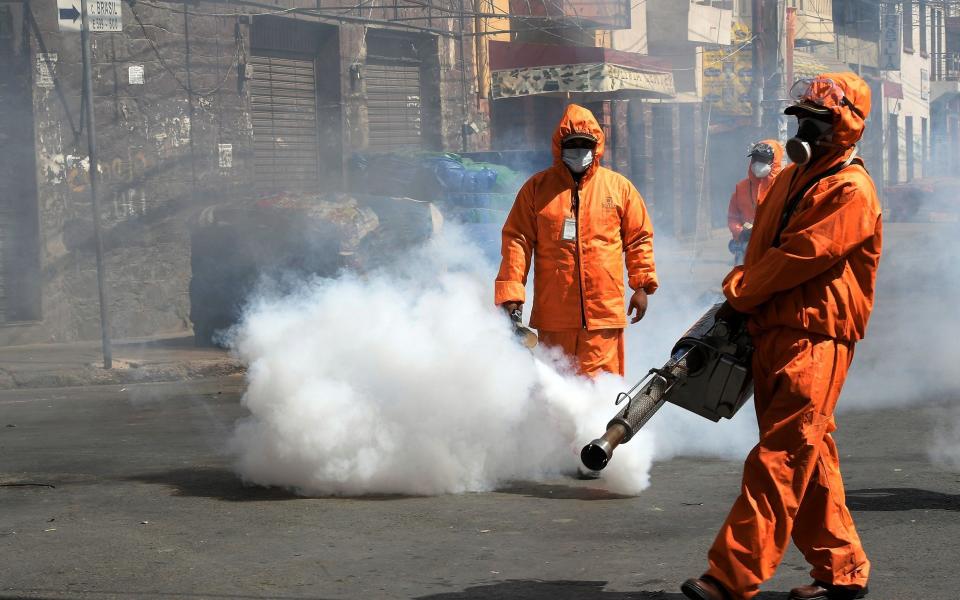
New Delhi, India:
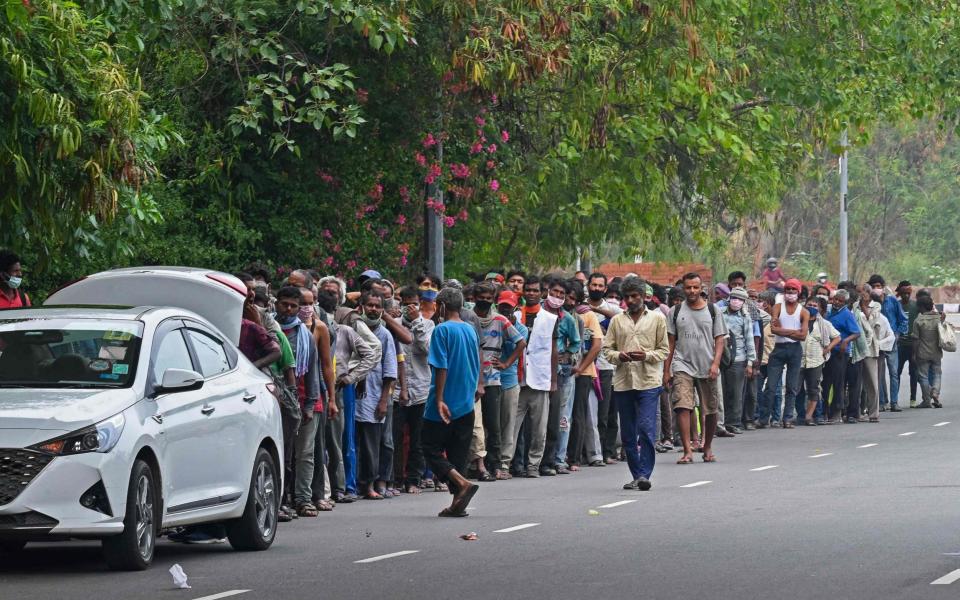
London, UK:
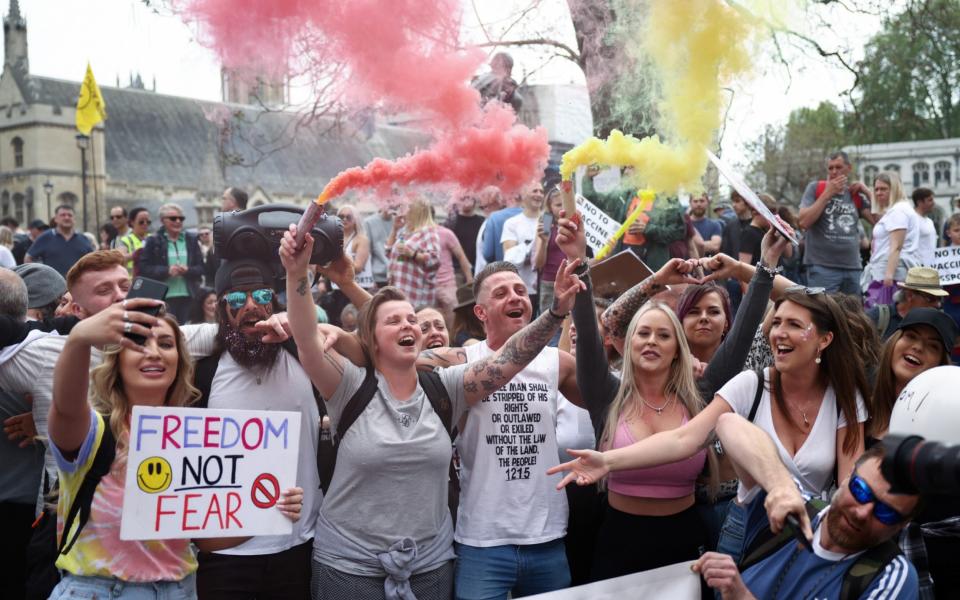
09:17 AMIndian crisis risks severing supply of vital drugs to the UK
Indian crisis risks severing supply of vital drugs to the UK
Britain is on amber alert. The country faces the prospect of a shortage of everyday medications, from painkillers and steroids to anaesthetics.
While one third of generic medicines used by the NHS are manufactured in Britain, the same proportion comes from India. The Covid crisis unfolding on the subcontinent has drastically reduced factory output.
The volume of medication being shipped to the UK is dropping and stocks could reach dangerously low levels in the coming months, the trade body representing generic drug makers in the UK has warned.
The British Generic Manufacturers Association (BGMA) says around two thirds of its members have suffered disruption to supplies. Of those, nearly three quarters say the impact could be felt in the next three months.
These drug makers are already stretched thanks to the pandemic so the supply chain squeeze from India poses a real threat, Mark Samuels, the BGMA’s chief executive, says.
Julia Bradshaw has more details on this story here.
09:05 AMCare homes were 'forgotten' in the early days of the pandemic
Care homes were 'forgotten' in the early days of the pandemic
Following on from the post below, here's the other side of the story: according to sector leaders, care homes were "forgotten" during the "dreadful" early stages of the Covid pandemic.
Mike Padgham, chairman of the Independent Care Group, which represents providers in York and North Yorkshire, told Sky News it had been a "frightening" time for staff and residents.
Mr Padgham was questioned in relation to the claim made by former Downing Street adviser Dominic Cummings to MPs this week that suggestions care homes were shielded were "complete nonsense":
"I don't believe myself there was a ring of protection thrown round us. In those very early days it was difficult. We were forgotten. We've been forgotten over decades. That's the only issue in social care.
"We weren't prepared. We weren't ready. We didn't have the PPE, we didn't have the testing. And it took the Government many, many weeks to actually see what was happening in homes, despite our best efforts and protestations."
The Telegraph visited one of the care homes Mr Padgham runs last summer, where 10 people died in a fortnight after a patient with Covid-19 was discharged from hospital without a coronavirus test. You can read our report from last June here.

08:50 AM'Hindsight is a wonderful thing': Vaccines Minister quizzed on care homes
'Hindsight is a wonderful thing': Vaccines Minister quizzed on care homes
The Vaccines Minister Nadhim Zahawi has defended Matt Hancock amid growing anger following Dominic Cummings' claims that the Health Secretary lied about testing for patients being discharged to care homes.
Asked by the BBC's Andrew Marr show this morning whether Mr Hancock misled the Prime Minister, Mr Zahawi said:
"Matt Hancock was very much focused on delivery. I think it's worth putting this in context, in the sense that in the eye of the storm we were only capable of doing about 2000 tests, a day early.
"What Matt did was to say that people going into care homes absolutely should be tested, and then the system NHS operationalised that and grew that number from 2,000 a day to the first target which was 100,000."
He also insisted that "hindsight is a wonderful thing".
Pushed again as to whether the Government really put a protective ring around care homes, as Mr Hancock has repeatedly insisted, Mr Zahawi said: "Yes I do".
He also refused to apologise for the deaths in care homes. Here's what Mr Zahawi said when asked to say sorry:
"We're going to have an inquiry, a proper public inquiry where ministers, and civil servants, and frontline practitioners can come and give them an under oath to hear the story. And if we make mistakes, of course we will absolutely come forward and apologise for them, and of course we will learn from them."
08:43 AM'Threatening' NHS staff with compulsory jabs bad idea, says Labour
'Threatening' NHS staff with compulsory jabs bad idea, says Labour
"Threatening" NHS staff to have the vaccine is not a good idea, according to Labour shadow cabinet minister Thangam Debbonaire.
Speaking to Sky News this morning, she said that working with staff, rather than against them, would be more conducive.
"Threatening staff, I don't think is a good idea," she said, adding that Public Health England and the NHS had been successful when they had worked with people to address their doubts and answer questions about the jab.
"I would like to see the Government work with the NHS and social care staff."
Related: NHS staff to face compulsory Covid vaccination
08:30 AMNew variants may impact decisions to vaccinate children
New variants may impact decisions to vaccinate children
The emergence of new coronavirus variants could influence the decision on whether to vaccinate children, an expert has said.
Professor Peter Openshaw, a member of the New and Emerging Respiratory Virus Threats Advisory Group (Nervtag), told Times Radio that there were "debates" about the possible risks of "very, very rare complications" associated with vaccination, which had to be balanced against the "certainty" that someone can get "very severe complications" by catching Covid.
Speaking in a personal capacity, he added:
"It may well be that actually giving children vaccines will become a clearer option once we know more about the disease in children and whether the new variants are spreading further into the paediatric population and causing more significant disease. That could certainly change the risk-benefit ratio."
Prof Openshaw said the UK placed an emphasis on "public health benefits" and therefore "vaccinating those who may be transmitting disease, sometimes unknowingly, is a perfectly good justification for vaccination".
"The new variants extending further down the age range and being of quite high prevalence even in children as young as four, it may be that actually children and school children are going to be a more important part of the transmission chain as the virus becomes more transmissible as new variants arise.
"So... the benefits might change and that might affect the decision about whether to vaccinate children in the future."
08:26 AMMinister confirms Government exploring compulsory jabs for NHS staff
Minister confirms Government exploring compulsory jabs for NHS staff
We reported today that NHS staff could be legally required to have a Covid vaccine under plans to crack down on transmission of the virus within hospitals (story here, and you can see our front page splash below).
Asked about the story by Sky News this morning caccines minister Nadhim Zahawi confirmed the Government was considering the move:
"It's absolutely the right thing and it would be incumbent on any responsible government to have the debate, to do the thinking as to how we go about protecting the most vulnerable by making sure that those who look after them are vaccinated," he said.
"There is precedent for this, obviously surgeons get vaccinated for hepatitis B, so it's something that we are absolutely thinking about."
The front page of The Sunday Telegraph: 'PM marries Carrie in secret ceremony' #tomorrowspaperstoday
📩 Sign up for the Front Page newsletter: https://t.co/UsfUCzx4yO pic.twitter.com/o7iUVWA5lD— The Telegraph (@Telegraph) May 29, 2021
08:10 AMMinisters knew about Indian variant in Britain for a fortnight before public told
Ministers knew about Indian variant in Britain for a fortnight before public told
Authorities knew that the Indian variant was in Britain for a fortnight before it was announced to the public, according to an investigation in the Sunday Times.
The paper reported that ministers were given the news of the variant’s arrival on April 1 - yet no official statement was made until April 15. And it was eight days later that India was finally placed on the travel red list.
By contrast, last December a travel ban was imposed on South Africa within two days after it was discovered that the strain from that country had entered Britain.
The Indian variant was spreading fast across India by late March and the country’s health officials had warned that it could be highly infectious and might undermine vaccines. People were dying without treatment because hospitals were overwhelmed.
However, no action was taken to stop travel from India even though the country’s neighbours, Pakistan and Bangladesh, were placed on the red list on April 2 - the day after ministers were informed the variant had been found in Britain.
At least 20,000 passengers - who could have been infected with the virulent new strain - were allowed to enter Britain in the first three weeks of April.
08:00 AMWatch: Why the Cummings attack could end up saving Matt Hancock's job
07:50 AMKeep to June 21 roadmap, hospitality urges Government
Watch: Why the Cummings attack could end up saving Matt Hancock's job
07:50 AMKeep to June 21 roadmap, hospitality urges Government
Keep to June 21 roadmap, hospitality urges Government
The British Beer and Pub Association has urged the Government to provide advance notice to businesses if restrictions are to remain after June 21.
The organisations chief executive, Emma McClarkin, acknowledged the Government was in a "difficult situation" but insisted Whitehall needs to "stick to its road map". Here's what she told BBC Breakfast:
"We need the Government to stick to its road map of removing those restrictions by the 21st of June if we want to see the great British pub really begin its recovery. What I need to say is June 21 is absolutely critical to the recovery of the sector. Recovery day only starts when the restrictions are removed.
"If the Government does leave any lingering restrictions in play then they really need to give us advance notice of that and it needs to talk seriously about financial compensation. But right now we are asking the Government to stick to their road map."
07:38 AMCases continue to surge in Malaysia after warning to 'prepare for the worst'
Cases continue to surge in Malaysia after warning to 'prepare for the worst'
Cases in Malaysia have dipped a little after five straight days of record case counts in the Southeast Asian nation.
The country reported 6,999 new coronavirus infections today, bringing the total infections in the country to 565,533. It's a slight decrease from yesterday, with 9,020 cases - the fifth consecutive day of highs, as the chart below shows.
Earlier this week Malaysia’s health authorities warned the public to “prepare for the worst” as cases surge.
The chilling message came from Dr Noor Hisham Abdullah, Malaysia’s director-general of health, who tweeted this week that the country’s daily infections are “following an exponential trend” and could trigger a “vertical surge.”
The spike in cases, which has picked up speed since April, means that Malaysia now has more than 200 cases per one million people – surpassing India, which has been devastated as the virus rampages out of control.
Nicola Smith has more details here on the unfolding situation.
07:15 AMCalls for more debate before easing restrictions
Calls for more debate before easing restrictions
A health chief has called for a more informed debate on the planned lifting of all legal limits on social contact in England on June 21.
The continued spread of the Indian variant has prompted experts to argue restrictions should remain in place until more people have received both doses of a vaccine amid reports ministers are drawing up plans for a partial end of lockdown.
NHS Providers chief executive Chris Hopson told BBC Breakfast a "much better quality of debate" was needed on the implications of easing measures.
Hospitals were dealing with patients with complex needs who had delayed treatment earlier in the pandemic and now required longer stays, he said. Staff were "going full pelt" to deal with waiting lists and do not have the space for a significant increase in Covid patients.
He also suggested the Government needs to consider the increased burden on hospitals in UK holiday hotspots in coming months, saying staff at trusts in such areas were "really worried" ahead of summer.
06:13 AMSocial distancing to kick off in Ho Chi Minh City
Social distancing to kick off in Ho Chi Minh City
Vietnam's business hub Ho Chi Minh City will begin social distancing measures in the city for 15 days starting from Monday in an effort to curb the spread of coronavirus, state-run Tuoi Tre newspaper reported today.
"All events that gather more than 10 people in public are banned city-wide, but the city is considering to lower the number of people to just five," the newspaper reported.
"While all citizens of Go Vap district are not allowed to go out if not necessary."
Ho Chi Minh City earlier this week shut down shops and restaurants.
05:44 AMCoronavirus hits worker at Melbourne aged-care facility
Coronavirus hits worker at Melbourne aged-care facility
Australia's state of Victoria reported five new local cases of Covid today, including in a worker at a Melbourne aged-care facility where not all of the residents have been vaccinated.
The infections on the third day of a week-long lockdown raise the total to 40 in the latest cluster, which started with a returning overseas traveller who tested positive after leaving a quarantine hotel.
Victoria's acting premier, James Merlino, said at a briefing that 70pc of the traveller's close contacts have so far tested negative for coronavirus.
The case at the aged-care facility was of an unknown origin, health authorities said, and residents have been confined to their rooms.
More than half of the residents and about a third of the staff have been vaccinated.
05:12 AMIndia: Lowest daily rise in cases in 46 days
India: Lowest daily rise in cases in 46 days
India has reported its lowest daily rise in new coronavirus infections in 46 days - 165,553 cases during the previous 24 hours.
Deaths rose by 3,460.
The nation's tally of infections now stands at 27.9 million, and the death toll has reached 325,972.
04:41 AMThe few vaccinated variant-carriers likely to be very infectious
The few vaccinated variant-carriers likely to be very infectious
Fully vaccinated people infected with Covid variants may be likely to pass the virus on, researchers have said.
No vaccine is 100 per cent effective, and while the number of people who contract Covid after vaccination – known as post-vaccine breakthrough cases – is tiny, a growing number of studies show that these cases are more likely to be infected with variants that have emerged in recent months.
READ MORE: Fully vaccinated people who catch Covid variants may pass virus on, study finds
04:02 AMCouples cancel summer weddings over reopening uncertainty
Couples cancel summer weddings over reopening uncertainty
Couples have already started to cancel or postpone their summer weddings due to a “vicious cycle” of uncertainty about the June 21 reopening date, say wedding planners.
Gina Brown, a wedding planner at Brown Bear Events, said the company’s first lot of clients to cancel had dates booked close to June 21, and were unwilling to risk lockdown restrictions not being lifted in time.
Some couples have even decided to cancel without a future date in mind; instead choosing to spend the time and money invested in wedding planning on starting a family earlier, said Ms Brown.
READ MORE: Couples cancelling summer weddings due to 'vicious cycle' of uncertainty over June 21 reopening
03:00 AMResearch reveals police concerns during pandemic
Research reveals police concerns during pandemic
A third of officers from one UK police force felt unsafe dealing with the public during lockdowns, according to research.
Police officers of different ranks and roles from Hampshire Constabulary were surveyed for the study by the University of Portsmouth.
About 35pc of those surveyed said they had been abused or threatened by a member of the public during lockdowns, while a third said they felt unsafe dealing with the public - although nearly 38pc said they did feel safe.
The report states that frontline officers recorded the lowest wellbeing scores, with custody staff, neighbourhood police and response and patrol officers reporting an increased burden resulting from workload pressures.
The research found that officers were concerned about potentially infecting family members with coronavirus and others had difficulties providing childcare, particularly with schools in lockdown.
Hampshire Assistant Chief Constable Maggie Blyth said: "The pandemic has placed significant pressures upon officers and staff, but the results of this research show that Hampshire Constabulary is successfully delivering support to the officers that need it."
02:55 AMVaccine clot patients 'monitored' as they may remain at risk
Vaccine clot patients 'monitored' as they may remain at risk
People who suffer from the rare clotting side effect linked to the AstraZeneca/Oxford University jab could be at risk of future clots for several months, a leading haematologist has warned.
Dr Sue Pavord, who heads the expert haematology panel advising the government on the condition, said that those who fall ill post-vaccine are followed up every other day to try to prevent any relapses.
However, she said she is aware of one case where the person suffered another thrombosis. The patient made a full recovery.
There have been 332 cases of the rare side effect - known as vaccine-induced thrombosis and thrombocytopenia (VITT) - in the UK up to May 19.
Read the full story here.
02:48 AMToday's top stories
- NHS staff would be legally required to have a Covid vaccine under plans to crack down on transmission of the virus within hospitals.
- Matt Hancock was facing new questions over the spread of Covid to care homes on Saturday night as it emerged that guidance from his department ordered hospitals to discharge patients without any mention of a need to test them first.
- Holidaymakers will be hammered by soaring prices if the Government keeps its green list for July and August under wraps, the boss of Heathrow Airport has warned.
- Health experts are urging Boris Johnson to consider giving the Covid-19 vaccine to children as young as 12 to protect teachers.
-
Long Covid is highly uncommon in children, scientific studies suggest. Children are far less at risk from Covid than adults and account for a miniscule number of cases and deaths.
-
High streets are threatened with a “tsunami” of shop closures as landlords are freed to claim billions of pounds in unpaid rent through the courts, retailers have warned.
Today's top stories
- NHS staff would be legally required to have a Covid vaccine under plans to crack down on transmission of the virus within hospitals.
- Matt Hancock was facing new questions over the spread of Covid to care homes on Saturday night as it emerged that guidance from his department ordered hospitals to discharge patients without any mention of a need to test them first.
- Holidaymakers will be hammered by soaring prices if the Government keeps its green list for July and August under wraps, the boss of Heathrow Airport has warned.
- Health experts are urging Boris Johnson to consider giving the Covid-19 vaccine to children as young as 12 to protect teachers.
-
Long Covid is highly uncommon in children, scientific studies suggest. Children are far less at risk from Covid than adults and account for a miniscule number of cases and deaths.
-
High streets are threatened with a “tsunami” of shop closures as landlords are freed to claim billions of pounds in unpaid rent through the courts, retailers have warned.
